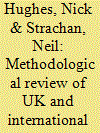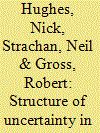|
|
|
Sort Order |
|
|
|
Items / Page
|
|
|
|
|
|
|
| Srl | Item |
| 1 |
ID:
098679


|
|
|
|
|
| Publication |
2010.
|
| Summary/Abstract |
Scenarios have a long history in business, politics and military planning, as a tool for strategic planning to inform protective, proactive or consensus-based decision making in the face of uncertain futures. Recent years have seen a growth in scenarios for assessing the implications of low carbon futures, but relatively little work has linked these energy scenarios to the broader literature on scenario development. This paper undertakes a methodological review of a selection of UK and international low carbon scenario studies, using a typology of 'trend based', 'technical feasibility' and 'modelling' studies. Dominant methodologies in such studies have been the 2×2 axis and the 'back-casting' approach. Strengths of the studies reviewed include technological detail, and identification of key economic and social constraints. Weaknesses include the over-reliance on constructs such as exogenous emissions constraints, and high level trends, which diminish the ability to understand how the various future scenarios could be brought about or avoided. This is compounded by the lack of depiction of specific system actors; the tendency to abstract policy from the scenarios; and the resulting failure to consider policy, technology and behaviour in an iterative, 'co-evolving' fashion.
|
|
|
|
|
|
|
|
|
|
|
|
|
|
|
|
| 2 |
ID:
117223


|
|
|
|
|
| Publication |
2013.
|
| Summary/Abstract |
Low carbon scenario and transition pathway analysis involves the consideration of uncertainties around future technological and social changes. This paper argues that uncertainty can be better understood, and the strategic and policy effectiveness of scenarios or pathways thereby improved, through a systematic categorisation of the different kinds of certain and uncertain elements of which the future is comprised. To achieve this, this paper makes two novel methodological contributions. First it proposes a system conceptualisation which is based on a detailed description of the dynamics of the actors and institutions relevant to the system under study, iteratively linked to a detailed representation of the technological system. Second, it argues that as a result of developing this actor-based low carbon scenarios approach it is possible to characterise future elements of the system as either pre-determined, actor contingent or non-actor contingent. An outline scenario approach is presented, based on these two contributions. It emerges that the different categories of future element are associated with different types of uncertainty and each prompt different strategic policy responses. This categorisation of future elements therefore clarifies the relationship of scenario content to specific types of policy response, and thus improves the policy tractability of resulting scenarios.
|
|
|
|
|
|
|
|
|
|
|
|
|
|
|
|
|
|
|
|
|